The Spiritual Teachings of the God Amun
I. Introduction
Amun, one of the most important deities in ancient Egyptian religion, embodies the essence of the divine and the mysteries of the universe. Often referred to as the “Hidden One,” Amun represents the unseen forces that govern existence and creation.
As a pivotal figure in the Egyptian pantheon, Amun transitioned from a local deity worshipped in Thebes to a national god revered throughout Egypt. His significance is not only rooted in mythology but also in the spiritual teachings he imparted, which continue to resonate with seekers of wisdom today.
This article aims to explore the profound spiritual teachings of Amun, shedding light on his role as a guiding force in moral integrity, creation, and the afterlife.
II. Historical Context of Amun Worship
The worship of Amun has deep historical roots in ancient Egypt. Initially, Amun was a local god of air and wind, primarily worshipped in the city of Thebes. Over time, his influence expanded significantly.
- Origins of Amun: Amun’s cult can be traced back to the Middle Kingdom (c. 2055–1650 BCE), where he began to gain prominence as a national deity.
- Evolution of Amun’s Role: By the New Kingdom (c. 1550–1070 BCE), Amun had evolved into the chief god of the Egyptian pantheon, often associated with kingship and power.
- Merging with Other Deities: Amun’s identity fused with that of Ra, the sun god, creating the composite deity Amun-Ra, symbolizing both hidden and visible aspects of divinity.
III. Core Spiritual Teachings of Amun
Amun’s teachings are deeply spiritual, focusing on the nature of the divine, creation, and the interconnectedness of all beings.
- The Nature of the Divine: Amun embodies the concept of the unseen force that permeates all existence. His essence teaches that the divine is not always visible, encouraging followers to seek a deeper understanding of the universe.
- Concepts of Creation: Amun is often associated with the creative power of the universe. His teachings suggest that creation is an ongoing process, reminding followers that they are active participants in the unfolding of life.
- Unity and Interconnectedness: Amun teaches that all beings are interconnected, emphasizing the importance of community and harmony in the cosmos.
IV. Amun’s Influence on Egyptian Morality and Ethics
Amun played a crucial role in shaping the moral and ethical landscape of ancient Egypt.
- Establishing Moral Codes: Amun’s teachings contributed to the development of moral codes that governed Egyptian society, focusing on the principles of justice and truth.
- Teachings on Ma’at: Central to Amun’s ethics is the concept of Ma’at, representing truth, balance, and order. Amun’s followers were taught to uphold Ma’at in their lives to maintain cosmic and societal harmony.
- Personal Integrity: Amun emphasized the importance of personal integrity and ethical behavior, which were essential for societal stability and individual fulfillment.
V. Rituals and Practices Associated with Amun
The worship of Amun was rich with rituals and practices that reinforced his teachings and engaged his followers spiritually.
- Key Rituals: Major rituals included offerings, prayers, and purification rites performed in his temples, aimed at seeking favor and guidance from Amun.
- Temples and Sacred Spaces: The grand temples dedicated to Amun, particularly the Karnak Temple, served as centers of worship and community, embodying the spiritual significance of his presence.
- Festivals: Festivals such as the Opet Festival celebrated the divine union of Amun and the pharaoh, emphasizing renewal and rebirth, which were fundamental to Amun’s teachings.
VI. Amun’s Role in Afterlife Beliefs
Amun’s influence extended into the realm of the afterlife, where his teachings offered guidance on the journey of the soul.
- Association with the Afterlife: Amun was regarded as a protector of the deceased, guiding souls through the afterlife and ensuring their resurrection.
- Journey of the Soul: His teachings provided insights into the judgment of the soul, where the deceased would face Ma’at to determine their fate in the afterlife.
- Eternal Life: Amun imparted the concept of eternal life, emphasizing that the soul continues to exist beyond physical death, a belief that was fundamental to Egyptian spirituality.
VII. Amun’s Legacy and Influence on Other Spiritual Traditions
Amun’s teachings have left a lasting legacy, influencing various spiritual traditions and philosophies.
- Impact on Later Religions: Amun’s concepts of a singular divine force influenced monotheistic religions and philosophies that emerged in the region.
- Modern Spirituality: Elements of Amun’s teachings can be seen in modern spiritual practices that emphasize interconnectedness and the search for inner truth.
- Comparative Analysis: Amun shares similarities with other deities across cultures, such as the hidden aspects of God in various traditions, illustrating universal themes in spirituality.
VIII. Conclusion
In summary, Amun’s spiritual teachings provide profound insights into the nature of the divine, ethical living, and the mysteries of existence. His influence on ancient Egyptian society and beyond remains relevant today, as individuals seek to understand their place in the universe.
Amun’s wisdom, emphasizing unity, morality, and the journey of the soul, invites us to explore our spiritual paths and connect with the unseen forces that shape our reality. As we reflect on Amun’s timeless teachings, we are encouraged to integrate these principles into contemporary spiritual practices, fostering a deeper understanding of ourselves and the world around us.




